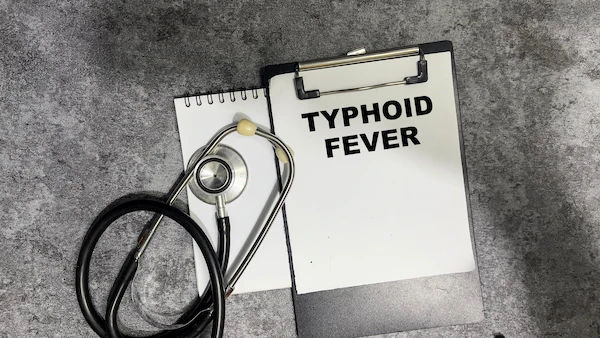Symptoms, Treatment, and Causes of Typhoid Fever
Discover typhoid fever, its symptoms, causes, and treatment options. Learn how this bacterial infection spreads, ways to manage it, and steps for prevention.

Written by Dr. Vasanthasree Nair
Reviewed by Dr. Dhankecha Mayank Dineshbhai MBBS
Last updated on 13th Jan, 2026

Typhoid fever is a serious bacterial infection that affects thousands of people every year, especially in areas with poor sanitation and limited access to clean water. While it can be life-threatening if left untreated, early diagnosis and proper care can lead to a full recovery.
In this article, we’ll break down everything you need to know about typhoid fever—its symptoms, causes, treatment options, and prevention tips—in simple, easy-to-understand terms.
What is Typhoid Fever?
Typhoid fever is an infection caused by the bacterium Salmonella Typhi. It spreads through contaminated food and water and can lead to high fever, stomach pain, and weakness. If not treated promptly, it can cause severe complications.
Consult a Top Specialist
Symptoms of Typhoid Fever
The symptoms of typhoid fever usually develop 1 to 3 weeks after exposure to the bacteria. They can range from mild to severe and may include:
High fever (up to 103–104°F or 39–40°C)
Headache and body aches
Weakness and fatigue
Stomach pain and bloating
Loss of appetite and weight loss
Diarrhea or constipation
Rose-colored spots on the chest or abdomen (in some cases)
Confusion or delirium (in severe cases)
Symptoms may worsen over time if not treated, leading to complications like intestinal bleeding or perforation.
What Causes Typhoid Fever?
Typhoid fever is caused by the Salmonella Typhi bacteria, which spreads through:
Contaminated food and water – Eating food or drinking water that has been contaminated with fecal matter from an infected person.
Poor hygiene – Not washing hands properly after using the toilet can spread the bacteria.
Close contact with an infected person – Typhoid can spread if someone handles food without washing their hands after being infected.
People living in or traveling to areas with poor sanitation are at higher risk.
How is Typhoid Fever Diagnosed?
If you experience persistent fever and other symptoms, a doctor may recommend:
Blood tests – To detect the presence of Salmonella Typhi.
Stool or urine tests – To check for bacteria.
Bone marrow test (in rare cases) – For more accurate detection.
Early diagnosis is crucial to prevent complications.
Treatment for Typhoid Fever
Typhoid fever is treatable with antibiotics. The treatment plan may include:
1. Antibiotics – Doctors prescribe specific antibiotics to kill the bacteria. It’s important to complete the full course, even if symptoms improve.
2. Hydration – Drinking plenty of fluids helps prevent dehydration from fever and diarrhea.
3. Rest – The body needs time to recover, so adequate rest is essential.
4. Hospitalization (in severe cases) – If complications arise, IV fluids and stronger antibiotics may be needed.
Note: Some strains of typhoid bacteria have become resistant to certain antibiotics. Always follow your doctor’s advice.
How to Prevent Typhoid Fever
Prevention is always better than cure. Here are some key steps to reduce the risk:
1. Vaccination
Two types of vaccines are available:
Injectable vaccine (lasts about 2 years)
Oral vaccine (taken as capsules, lasts about 5 years)
Consult your doctor before traveling to high-risk areas.
2. Safe Food and Water Habits
Drink boiled or bottled water.
Avoid raw or undercooked food.
Wash fruits and vegetables thoroughly.
Eat hot, freshly cooked meals.
3. Maintain Good Hygiene
Wash hands with soap before eating and after using the toilet.
Avoid street food in areas with poor sanitation.
When to See a Doctor?
Seek medical help if you or a loved one has:
Persistent high fever (more than 3 days)
Severe stomach pain
Blood in stool
Extreme weakness or confusion
Early treatment can prevent serious complications.
Final Thoughts
Typhoid fever is a serious bacterial infection that requires timely diagnosis and proper treatment to prevent complications. Recognizing symptoms such as high fever, abdominal pain, and weakness is essential for early intervention. With appropriate antibiotics, supportive care, and preventive measures like safe food and water practices, typhoid can be effectively managed and the risk of recurrence reduced.
Consult a Top Specialist
Consult a Top Specialist
Dr. Shamim Anjum
Family Physician
15 Years • MBBS, M MED (Family Medicine)
Hyderabad
FAMILY CARE CLINIC, Hyderabad

Dr. Rajib Ghose
General Physician/ Internal Medicine Specialist
25 Years • MBBS
East Midnapore
VIVEKANANDA SEBA SADAN, East Midnapore
Dr. Konda Sanjith
General Physician/ Internal Medicine Specialist
4 Years • MBBS,MD(General Medicine)
Manikonda Jagir
Apollo Clinic, Manikonda, Manikonda Jagir

Dr. Utsa Basu
Diabetologist
14 Years • MBBS , MD
Barasat
Diab-Eat-Ease, Barasat
(75+ Patients)

Dr. Imtiyaz Khan
General Physician/ Internal Medicine Specialist
6 Years • MBBS
Bengaluru
Apollo Clinic, Sarjapur Road, Bengaluru

.webp)